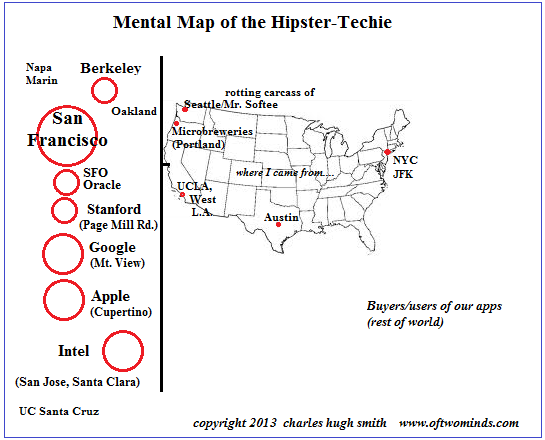We all have inner maps that assign awareness, priority and importance to geographic features. For those who work inside the Beltway, Washington D.C. dominates their mental map of the world. Residents of Manhattan famously regard it as the center of the financial, art, fashion, etc. world.
In the hipster techie mental map, Washington D.C. doesn't exist, and New York has a small tech innovation footprint. In this world view, politics, finance and fashion are not what changes the world for the better; only tech does that.
Everyone wants to defend their city as important, if not the center of the universe, but the reality is that people who want to "make it" gravitate to the capital of their interest, be it Nashville, New York City, Hollywood, San Francisco or a regional magnet-city.
The typical hipster techie works for a start-up or fast-growing company in the social media / e-commerce / marketing mobile/web apps/software space. While these firms can be found in many cities, a great many are located in San Francisco and the S.F. Bay Area (Silicon Valley, etc.) for a variety of reasons, including a culture that celebrates innovation and understands that failure and success are two aspects of the same dynamic.
Having a start-up crash and burn is a disaster in most places; in the Bay Area, it is generally regarded as "getting your sea legs."
Three large research universities--two of the premiere public universities, University of California, Berkeley ("Cal") and University of California, San Francisco (UCSF) and one of the premiere private universities, Stanford-- act as incubators of start-ups which have access to seed money from a high concentration of venture capital. Two national labs provide government support of research: Lawrence Berkeley National Laboratory and Lawrence Livermore National Laboratory.
These elements spawn waves of newcomers and start-ups, most of which eventually fail or are bought up by established tech firms.
Many locales around the world have attempted to recreate the "magic" of Silicon Valley; the recipe is not that easy to duplicate. Many feel the Valley has lost its edge; as global competition increases, perhaps that can be said of every established innovation center.
If you've been offered a job in S.F. with a mobile apps start-up, here are 25 Things I wish I knew before moving to San Francisco by Jason Evanish (via Maoxian).
Here is one approximation of the hipster techie mental map:

Notes:
SFO: San Francisco International Airport
JFK: John F. Kennedy International Airport
Page Mill Road: home to many start-ups and Stanford Research Park
Not to be confused with Sand Hill Road, the concentration of venture capital (VC) firms (a.k.a. vulture capital)
Not to be confused with Sand Hill Road, the concentration of venture capital (VC) firms (a.k.a. vulture capital)
Mr. Softee: MSFT, Microsoft
See Steve Ballmer's Nightmare Is Coming True: the slow death of Microsoft
See Steve Ballmer's Nightmare Is Coming True: the slow death of Microsoft
Things are falling apart--that is obvious. But why are they falling apart? The reasons are complex and global. Our economy and society have structural problems that cannot be solved by adding debt to debt. We are becoming poorer, not just from financial over-reach, but from fundamental forces that are not easy to identify or understand. We will cover the five core reasons why things are falling apart:
 1. Debt and financialization
1. Debt and financialization2. Crony capitalism and the elimination of accountability
3. Diminishing returns
4. Centralization
5. Technological, financial and demographic changes in our economyComplex systems weakened by diminishing returns collapse under their own weight and are replaced by systems that are simpler, faster and affordable. If we cling to the old ways, our system will disintegrate. If we want sustainable prosperity rather than collapse, we must embrace a new model that is Decentralized, Adaptive, Transparent and Accountable (DATA).
We are not powerless. Not accepting responsibility and being powerless are two sides of the same coin: once we accept responsibility, we become powerful.
Kindle edition: $9.95 print edition: $24 on Amazon.com
To receive a 20% discount on the print edition: $19.20 (retail $24), follow the link, open a Createspace account and enter discount code SJRGPLAB. (This is the only way I can offer a discount.)
| Thank you, Charles R. ($100), for your outrageously generous contribution to this site -- I am greatly honored by your support and readership. | Thank you, Keith B. ($50), for your superbly generous contribution to this site --I am greatly honored by your steadfast support and readership. |
